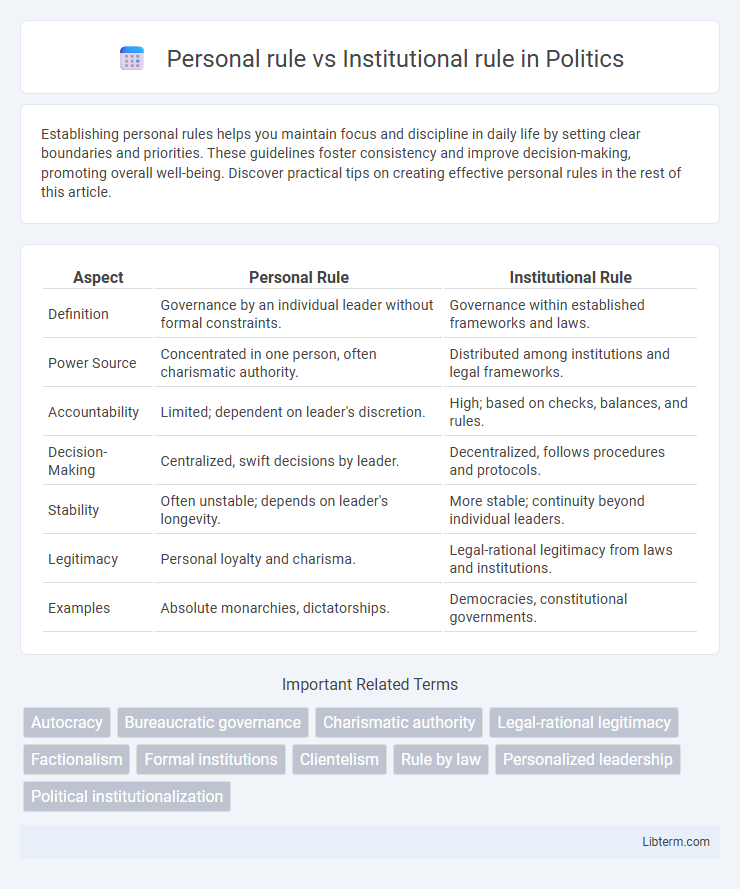Establishing personal rules helps you maintain focus and discipline in daily life by setting clear boundaries and priorities. These guidelines foster consistency and improve decision-making, promoting overall well-being. Discover practical tips on creating effective personal rules in the rest of this article.
Table of Comparison
| Aspect | Personal Rule | Institutional Rule |
|---|---|---|
| Definition | Governance by an individual leader without formal constraints. | Governance within established frameworks and laws. |
| Power Source | Concentrated in one person, often charismatic authority. | Distributed among institutions and legal frameworks. |
| Accountability | Limited; dependent on leader's discretion. | High; based on checks, balances, and rules. |
| Decision-Making | Centralized, swift decisions by leader. | Decentralized, follows procedures and protocols. |
| Stability | Often unstable; depends on leader's longevity. | More stable; continuity beyond individual leaders. |
| Legitimacy | Personal loyalty and charisma. | Legal-rational legitimacy from laws and institutions. |
| Examples | Absolute monarchies, dictatorships. | Democracies, constitutional governments. |
Defining Personal Rule and Institutional Rule
Personal rule refers to a governance system where authority is concentrated in the hands of a single leader, often characterized by arbitrary decision-making and limited checks on power. Institutional rule is defined by structured governance through established laws, regulations, and institutions that ensure accountability and distribute power across various branches or bodies. This distinction highlights the contrast between personalized leadership and rule-bound administration in political and organizational contexts.
Historical Context of Governance Styles
Personal rule, prevalent in many pre-modern societies, centralized power in the hands of a single ruler, often legitimized by tradition, religion, or charisma, exemplified by monarchies and autocratic regimes. Institutional rule emerged alongside the development of legal-rational authority, emphasizing structured governance through codified laws, bureaucratic administration, and institutional checks, as seen in republics and constitutional monarchies. The transition from personal to institutional rule reflects a historical evolution towards codified governance systems designed to limit arbitrary power and enhance political stability.
Key Characteristics of Personal Rule
Personal rule centers on the concentration of power in the hands of an individual leader, often characterized by arbitrary decision-making, limited accountability, and weak or bypassed formal institutions. It features a lack of institutional checks and balances, reliance on patronage networks, and governance through personal loyalty rather than codified laws. This type of rule contrasts sharply with institutional rule, where authority is distributed across established structures and governed by transparent, consistent rules.
Core Features of Institutional Rule
Institutional rule is characterized by established frameworks, formalized governance structures, and consistent legal norms that govern political authority, contrasting with personal rule's reliance on individual discretion and informal networks. It ensures accountability through codified laws, separation of powers, and bureaucratic administration, promoting stability and predictability in policy implementation. Core features include legitimacy derived from codified constitutions, transparent decision-making processes, and adherence to rule of law principles that limit arbitrary exercise of power.
Leadership Dynamics in Personal Rule Systems
Leadership dynamics in personal rule systems are characterized by centralized authority where decision-making power rests primarily with an individual leader rather than formal institutions. Personal rulers often rely on patronage networks and loyalty to maintain control, shaping governance through personal relationships instead of codified rules. This concentration of power can lead to unpredictability and limited accountability compared to institutional rule systems.
Stability and Predictability under Institutional Rule
Institutional rule establishes stability and predictability by embedding governance within established frameworks, reducing arbitrary decision-making and power fluctuations often seen in personal rule. Structured legal systems and consistent enforcement of policies under institutional rule foster long-term economic growth and social cohesion. This predictability encourages investment and civic trust, essential for sustainable development and effective governance.
Impact on Political Accountability
Personal rule often diminishes political accountability by concentrating decision-making power in the hands of a single leader, reducing transparency and weakening institutional checks and balances. Institutional rule fosters accountability through structured governance systems, enabling mechanisms like elections, judicial oversight, and legislative scrutiny to hold leaders responsible. Empirical studies show that countries with strong institutions typically exhibit higher levels of political accountability and lower corruption rates compared to those dominated by personalist regimes.
Economic Outcomes: Personal vs. Institutional Rule
Institutional rule fosters economic growth by ensuring property rights, enforcing contracts, and promoting market competition, which creates a stable environment for investment and innovation. Personal rule often leads to economic inefficiencies due to arbitrary decision-making, favoritism, and lack of accountability, which discourage private enterprise and distort resource allocation. Empirical studies show countries with strong institutions achieve higher GDP per capita and more sustainable development compared to those dominated by personalist regimes.
Case Studies: Comparing Governance Models
Case studies comparing personal rule and institutional rule reveal distinct governance outcomes based on leadership structures and stability. In countries like Zimbabwe under Robert Mugabe, personal rule led to centralized power and weakened institutions, resulting in decreased transparency and economic decline. Conversely, institutional rule exemplified by Germany's federal system fosters accountability, policy consistency, and sustainable development through robust legal frameworks and power distribution.
Transitioning from Personal to Institutional Rule
Transitioning from personal rule to institutional rule involves shifting governance from the concentration of power in a single leader to a system based on established laws and formal institutions. This transition often requires the development of constitutional frameworks, independent judiciary, and bureaucratic structures to ensure accountability and predictability in decision-making. Successful institutionalization reduces arbitrary authority and enhances political stability, promoting sustainable governance and democratic consolidation.
Personal rule Infographic

 libterm.com
libterm.com